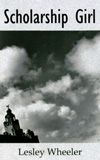September 25, 2008SCHOLARSHIP GIRL by Lesley Wheeler
 Review by Wendy Vardaman
Review by Wendy Vardaman
SCHOLARSHIP GIRL
by Lesley Wheeler
Finishing Line Press
P.O. Box 1626
Georgetown, KY 40324
ISBN: 978-1-59924-226-2
25 pp., $12.00
www.finishinglinepress.com
Scholarship Girl is Lesley Wheeler’s first poetry collection, although Wheeler, Professor of English at Washington and Lee University, is the author of two scholarly books, and the co-editor of Letters to the World, a just-published anthology of contemporary women’s poems from the Women’s Poetry List-Serv. The chapbook displays a careful attention to craft, particularly to sound, a deft use of form, and considerable thought regarding some significant problems in contemporary poetry, especially the viability of the historical poem, whose devices, like description and personae, Wheeler demonstrates command of while simultaneously pointing, as a contemporary ethnographer might, to their limits.
Thus the collection opens with “Remembering My Mother’s Childhood,” a poem written in unmetered quatrains where near-rhyme and assonance replace the exact rhyme of the older historical poem, and personal content—here the mother/daughter relationship—is foregrounded against a particular geographical and historical background that comes in and out of focus throughout the book to form, along with family connections, the force that binds these poems together:
When she says stove she means fireplace,
a great soot-blackened maw. When I say
Liverpool I mean an unreal city, purified
of reeking detail like a fairy taleor a film set, rotted and peeling
like cheap furniture handed down. A girl
might safely climb into the leaping
flames, they are so rinsed and mythical,so cooled by duplication. I cannot
even place the telling—whether
in a kitchen I could strew with tokens
of work and talk, daughter and mothercrying over onions, or in some moving
car. My memories of her memories
are too reduced.
Thus, at the outset, Wheeler points the reader to the problems historical poems used to obscure: of language and of translation from one culture to another; of perspective; of knowledge—how the poet comes to have this information; of distortion. Despite all of that, however, Wheeler argues that the notion of history has validity, as well as serious consequences: “I invent this blitzed, hungry, smoke-thin world/because it invented me, and lies//are my birthright. Some history may/be true. Even mine.”
Interestingly, we do not always know how characters relate to the poet’s mother, who grew up in post-War Liverpool, because Wheeler often allows the apparatus of herself as poet to recede, as in two very fine pieces, “Scholarship Girl, 1953” and “Royal Liverpool Babies Hospital, 1956,” either of which could be historical non-fiction or historical fiction. Both poems center on character, a “scholarship girl” in the former piece, an anti-heroine in a dingy Britain where “no one has cleaned the war up yet”; she is unwanted, small, insignificant:
But first there are rationed eggs,
and her sister calling Elephant eyes,
and scholarship girls quarantined
in one crowded classroom.
Caesar’s speeches will deflate
her one hot puff at a time
til she fits in anybody’s pocket:
the starchy white one of the Sister
who docks her bus fare
in fine for laddered stockings,
or mine, or even yours. Listen
for her nails scratching
against the fabric.
In “Royal Liverpool Babies Hospital, 1956,” the main character, an improbably named Batty Batstone, is an infant whose life demonstrates the senselessness of history and our often sad attempts to make it meaningful:
Batty Batstone, nine months old, was dozing
in her pram, left alone in the back garden,
dreaming of bees and lavender, when the rockets
dropped. Her familyall killed instantly. Like an herb in an untended
bed, she grew up spindly and short of bloom. In
nursing school she aspired to spotlessness, shunning
cigarettes, sweetness.Other students mocked her for peeling oranges
in the bath, but nothing stuck to her. If she were
clean enough, the damaged babies would slumber
safely in her hands.
The centerpiece of Scholarship Girl is Wheeler’s sonnet crown, “The Calderstones,” a series of fourteen inter-linked, unmetered sonnets whose circular structure embodies the falsely imposed circle of the rebuilt stones, as well as the circle of mother leaving and daughter returning in the story of the poet’s trip to Liverpool to visit her mother’s family. The Calderstones themselves symbolize post-war Britain: its fall from power, its decay, the displacement of those like her mother who left:
These rocks, older than the hulks at Stonehenge,
once braced a burial chamber hexed by loops,
cups, spirals, arcs. They lost their first site so lanes
could be widened. The mound itself was scooped
up as fertilizer. Liverpool shrugs and shrines
topple—are built again as a hobbyist’s quirk.
It was a mistake to arrange them in circle.
The images here and throughout “The Calderstones” are brutally dismal and empty, from the worn stone to the slavery that built the nearby suburbs, to the silt-choked river, to the hunger and deprivation of the children growing up in 1950’s Britain. The rhymes themselves underscore the fall of an empire: lanes/shrines, loops/scooped, quirk/circle, as if it’s just pieces of words that remain to chime with each other, rather than whole words. Small wonder that action-filled American Westerns seduced the poet’s mother to their sunlit, shiny shores; still, those movies turned out to be other than what they appeared, “filmed on combustible nitrate stock—“ that has subsequently “lapsed into flames.” The gritty Calderstones, meanwhile, though lodged amid “untidy brush,” endure.
Wheeler’s concerns in Scholarship Girl include war, powerlessness, loss, and the imagination’s limits, as well as the gray territory of the autobiographical 1st person narrator who appears to be the poet, but could just as easily be fictional, at least fictionalized in part; her collection also demonstrates aspects inherent to the well-conceived chapbook: tightly focused themes, sustained exploration of a small number of characters, deep attention to craft, and the brilliance that can be achieved through careful polishing–a brilliance whose importance in a grimy world is clear.